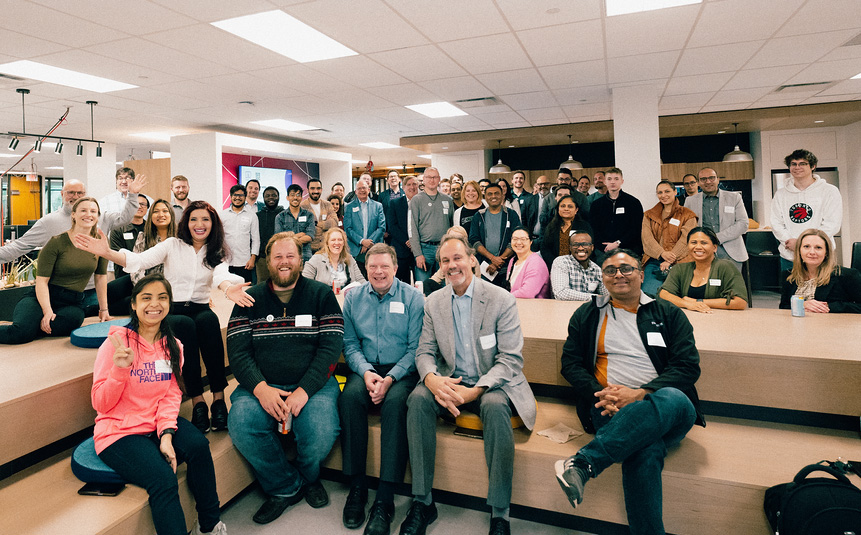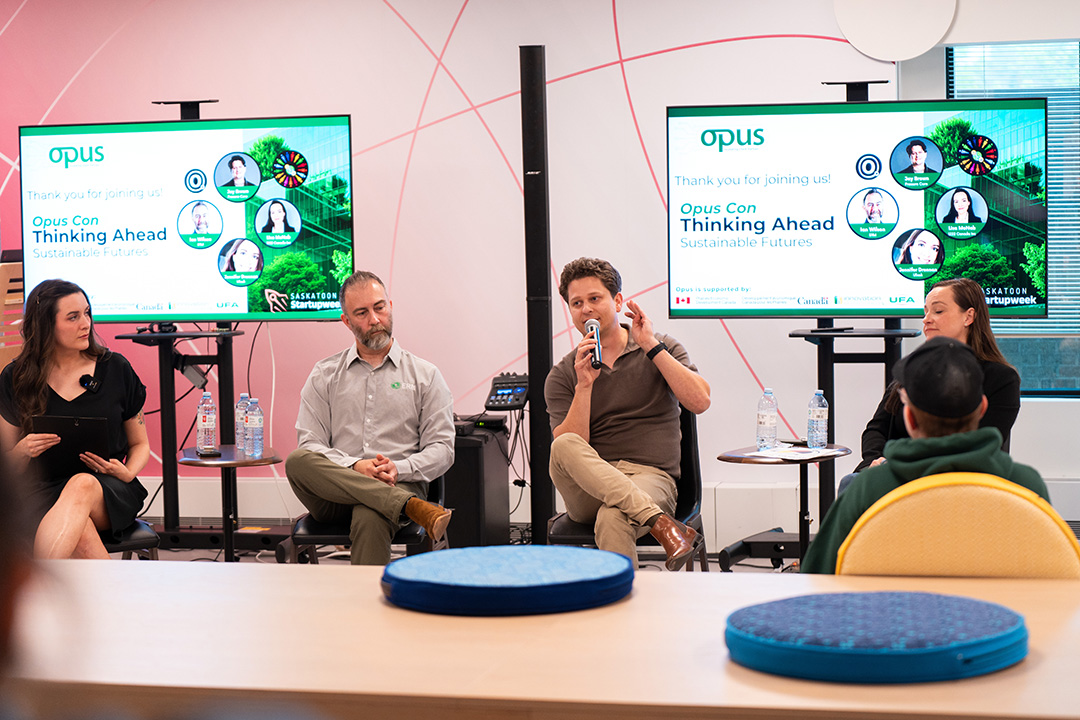
Catalyzing deep tech
Just as universities are shaped by their location – which guides academic direction, research and more – educational institutions influence their surroundings through contributions to the talent pool, research and development, and engagement with industry and communities.
By GLOBE AND MAIL SASKATCHEWAN ADVANTAGE REPORTThere is an additional superpower universities can leverage: they catalyze innovation with ripple effects with local, regional, national – and even international reach. Illustrating such an impact are recent innovations coming out of the University of Saskatchewan (USask), for example, a minilab that enables in-field crop testing.

"A company called PathoScan has developed a little scientific instrumentation box, so farmers don't have to go through the lengthy process of sending out samples and having to wait for results before they know whether they have disease in their field and how to address it," says Alix Hayden, director, Innovation Mobilization and Partnerships at USask's Office of the Vice-President Research. "Imagine the impact of this innovation for growers and food producers, for farming communities and for food security in general."
The portable "lab-in-a-field" – which covers a range of tests and can be used in many settings, including greenhouses and remote locations – was started by two USask students, who have already attracted investors as well as customers.
The startup reflects two of USask's particular strengths, says Hayden. "As a research-intensive university, our focus is on deep tech: companies and technologies built on significant scientific insights and associated with proprietary intellectual property. Another important consideration is that we are outward-facing – towards communities, the region, the country and the world – to provide solutions that help address urgent needs."
The objective, to have the pulse of society to be able to respond to emerging conditions, comes out of the realization that "the inventions and ideas we're looking to move out of the university are only innovative when community or industry partners actually make use of them," she says. "That's an important measure for us."
Innovation-powered regional impact

Saskatchewan’s tech sector is outpacing Prairie provinces Alberta and Manitoba in employment growth, with an increase of 108.6 per cent over five years, according to a report by Derek Murray Consulting and Associates, which also showed that the tech sector accounted for 10 per cent of all job creation in the province from 2016 to 2023.

Saskatoon, the province's largest city, has a reputation as a tech hub, which has long been fueled by startups "founded and peopled by graduates and faculty from the University of Saskatchewan," says Peter Stoicheff, the university's president. "Seeing so much momentum happening naturally, we asked ourselves, 'Imagine what we can achieve if we're more intentional about this?'"
This inspired efforts to ensure "we pay attention to having a strong culture of innovation and entrepreneurship," says Stoicheff. "As a result, we created Opus," which offers free support to anyone at USask interested in building out a business idea, looking to develop business skills or hoping to network with like-minded individuals.
As a startup incubator and accelerator, Opus has also gained support from “terrific individuals from the local business community. It’s been a great success, and these benefits have been recognized with funding from the province,” he adds.
“Over the last four years, we’ve had almost 100 people across about 40 different ventures come through our Opus program, since companies are often started by teams,” says Ms. Hayden. “Some companies started with us two or three years ago – and are still in our programs while they advance toward market adoption.”
In addition to PathoScan, success stories include TrackPoint.ai, which provides artificial-intelligence-powered tools for practising interviews and creating presentations, and Excir, a company advancing technology to extract precious metals from e-waste and other secondary sources. All have been able to attract interest from potential partners and investors.
From invention to venture

It starts with a great idea that can become a business. Hayden explains that USask aims to prepare the ground for such ideas to germinate and grow, for example, through providing research infrastructure – and encouraging interdisciplinary collaboration as well as entrepreneurial thinking.
"What does entrepreneurial thinking mean? It means a tolerance for taking risks – and being comfortable with a cycle of trying and failing, and trying again," she says. "It also means having curiosity about a diversity of ideas and solutions-based thinking."
It takes time and sustained efforts to commercialize innovations, especially those that address big challenges in areas such as food security and sustainability, for example, Hayden says. "So, what else do entrepreneurs need? They need experts, mentors and coaches from the community and relevant sectors, advice on intellectual property, and more. That's why Opus provides a network of wraparound supports."
Underpinning Opus's commercialization potential is a foundation in research excellence and collaboration, she emphasizes. "The machinery powering our basic research, including a constellation of research institutes, infrastructure and high-quality collaborators, is what allows us to jump in and address emerging needs."
Interdisciplinary is also increasingly a necessity. While domain-specific research seeks to address specific problems, "innovations like PathoScan, for example, require the coming together of different disciplines and different expertise, such as agriculture and biological research, computer science and engineering," she says. "The goal of coming up with robust solutions has changed the way we do research, which has become a more collaborative and interdisciplinary pursuit."
Mutual appreciation and support amplifying potential
The quest to understand local challenges and opportunities – and collaborate on potential solutions – has USask researchers engage with communities, industry and government in the province.
"There is a lot of research, scholarly and artistic work, and outreach happening," says Stoicheff. "The response we see tells us that people value the university and want to see it succeed."
The outcomes of USask's recent comprehensive campaign – a strategic initiative to increase recognition in its core areas of excellence, develop government relations and build external community support –provide evidence of such appreciation, he explains. "We had the ambitious goal of raising half a billion dollars, significantly more than in previous campaigns. We not only met but exceeded that goal, and many supporters come from this province. This tells us that people feel our university is important."
Major donor funding is earmarked for the Slogotski Hunt Centre for Entrepreneurship, which "will bring together faculty and students as well as business and community leaders to work together to strengthen that culture of entrepreneurship in collaboration with Opus," Stoicheff says. "As a research-intensive university, we have an important role to play in this important ecosystem."
Collaborations between the university, industry and the province – sometimes referred to as a triple helix model of innovation – can help translate University of Saskatchewan research into local impact, he adds.
By powering up the development and commercialization of new technologies, this partnership approach is bound to elevate Saskatoon's reputation as a tech hub as well as support Saskatchewan's technological and economic ambitions.
A startup-friendly ecosystem
In recognition of the powerful potential of innovation to drive economic growth and create jobs, the Province of Saskatchewan has made supporting innovation a priority. Measures for bolstering a startup-friendly environment include tax incentives for startups and the local investors supporting them as well as funding opportunities for projects uniting the academic and private sectors.
Here are three impactful made-in-Saskatchewan startups:
TrackPoint.ai is an artificial intelligence platform that helps with presentation, interview, and communication skills. Providing feedback on content as well as body language and speaking style, it allows people to practise in a safe space. Use cases include presentations in educational settings as well as pitching startups to investors. Potential additional applications include providing tools for trainees, such as medical students, to practice respectful and effective communication with different demographics, including newcomers to Canada and Indigenous communities.
Excir, which started in 2017, developed a patent based on new chemistry to extract gold and precious metals from electronic waste. The technology startup's focus on metals recycling recently attracted the attention of the Royal Mint, which manufactures the U.K.'s coins and other precious metal products. There is now a partnership in place, where Excir technology is used by the Royal Mint to manage electronic waste in the U.K.
PathoScan developed a portable, in-field crop diagnostic tool called the PathoBox that allows farmers to quickly and cost-effectively test crops for diseases without needing technical expertise. The system uses miniaturized and portable polymerase chain reaction technology, which provides results in as little as 45 minutes to two hours with high accuracy. This enables farmers to make immediate decisions that can reduce crop loss and increase yields.

